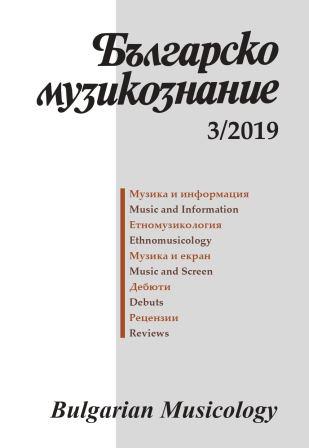Ромео Смилков: „клавирната музика на Димитър Ненов (от интерпретационна позиция)“
Romeo Smilkov: „The Piano Music of Dimiter Nenov (from an Interpretational Standpoint)“
Author(s): Polina AntonovaSubject(s): Essay|Book Review |Scientific Life, Book-Review
Published by: Институт за изследване на изкуствата, Българска академия на науките
Summary/Abstract: The book “The Piano Music of Dimiter Nenov (from an Interpretational Viewpoint)” by famous Bulgarian piano player Romeo Smilkov, performer and researcher of the composer’s oeuvre, is a study commanding respect for its conception and construction, voluminousness and content. The complete piano works by one of the most brilliant members of Bulgaria’s music elite from the first half of the twentieth century has been comprehensively considered and analysed for the first time ever. Romeo Smilkov gave an integral performance of all Dimiter Nenov’s piano pieces in Plovdiv, 2006 and Sofia 2007. He is among the few Bulgarian pianists who have played the Concerto for Piano and Orchestra (Razgrad, 1996). He has made a number of recordings and taken part in the editing of A Theme with Variations in F Major and Toccata (2001). His work on Dimiter Nenov’s vocal and instrumental pieces has inspired piano transcriptions of the composer’s songs for voice and piano, e.g. Evensong (1934), The Saintly (1930, lyrics by Elisaveta Bagriana), Woodcutter (Waiting for Lord’s Night) (1937, lyrics by Dimiter Panteleev), as well as The Sun Went Down (1929) and The Eternal (1931) for four hands made in 1992. He has also authored the study Dimitar Nenov’s Piano Music from the First Half of the 1930s, the book Dimitar Nenov: Piano Works from the First Half of the 1930s, and Theme with Variations in F Major (Sofia: Dobrev, 2001). Central to the present book are the pieces of the 1920s and 1930s, a period of great significance for the creative growth and maturation of the composer. Smilkov seeks to offer deep insights into his pianistic style from an interpretational standpoint (such as influences, ideas, development, metamorphoses, etc.) in the context of the piano works by composer and interpreter Dimiter Nenov so as to formulate the main hypothesis of the study, namely that the piano pieces were the defining and principle genre in Dimiter Nenov’s work in terms of music and culture. The book has been structured chronologically. The complete periodisation of Dimiter Nenov’s piano works draws to a large extent on archival material giving the text authenticity, which is yet another essential aspect of the study. To Romeo Smilkov, the chamber vocal music by Dimiter Nenov plays a special role defined as a “high zone” in Bulgaria’s musical culture. The monographic study actively joins the contemporary interpretation of Dimiter Nenov’s significance to the Bulgarian piano and compositional school both internationally and locally, and shows profound experience in complex problematics. It provides interpreters and researchers of Dimiter Nenov’s musical and cultural legacy with new information and a different standpoint. Thus, it fits in with the rest of Bulgarian musicological literature in a truly valuable way.
Journal: Българско музикознание
- Issue Year: 2019
- Issue No: 3
- Page Range: 113-116
- Page Count: 4
- Language: Bulgarian
- Content File-PDF

